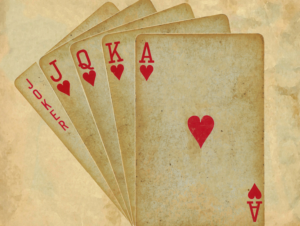Poker, a game that has stood the test of time and cultures, has a fascinating journey of evolution that spans centuries. Its transformation from its humble origins to a global sensation is a captivating tale that showcases not only the growth of a game but also the sociocultural shifts it has mirrored.

Origins of Poker
Poker’s roots can be traced back to the 16th century, primarily in Europe. The game’s early forms were intriguing and varied, encompassing elements of betting, bluffing, and hand rankings. These rudimentary versions bore similarities to various card games played in China and Persia, suggesting a multicultural genesis.
Poker in the United States
Poker sailed across the Atlantic and found a new home in America during the early 19th century. As it settled in the U.S., the game underwent further changes. The 52-card deck was introduced, and the concept of a flush was added, enhancing the complexity and excitement of the game. The Gold Rush era was instrumental in spreading poker throughout the nation, firmly establishing it as a part of American culture.
Poker During Turbulent Times
During the Civil War, poker gained immense popularity among soldiers. It was not just a game of chance but a way for them to pass the time and form bonds. Post the war, poker continued to flourish, finding its way into saloons and gambling houses. It became synonymous with the American frontier, captivating the imaginations of both the common man and literary greats like Mark Twain.
Rise of Poker Variants
As poker spread and gained popularity, various versions and variations emerged. Stud poker, draw poker, and community card poker were among the early variants. These diversifications introduced different dynamics and strategies, attracting an even broader player base. The 20th century saw the advent of Texas Hold’em, which would later become the poster child for modern poker.
Poker and Pop Culture
The 19th century saw poker become synonymous with the Wild West. It was the game of choice in saloons and on riverboats, played by cowboys, gamblers, and adventurers. Poker’s presence in literature, movies, and folklore during this era contributed to its enduring association with the rugged, frontier spirit of the American West.
Online Poker Takes Center Stage
The advent of online poker platforms in the late 1990s and early 2000s transformed the landscape of the game. It offered accessibility, convenience, and a plethora of options for players. Online poker not only popularized the game but also revolutionized its dynamics, introducing new strategies and ways of playing. The ease of play attracted a younger demographic, ensuring the game’s continuity and growth.
The Rise of Poker Celebrities
With the proliferation of televised poker tournaments and online platforms, poker players began to achieve celebrity status. Names like Doyle Brunson, Phil Hellmuth, and Daniel Negreanu became synonymous with the game. The poker world saw the emergence of personalities whose skills, wit, and charisma transcended the felt tables.
Poker in the Modern Era
Today, poker has evolved into a game that appeals to players of all ages and backgrounds. Whether you’re a professional player competing in high-stakes tournaments, a casual enthusiast enjoying home games with friends, or an online player seeking a virtual challenge, poker offers a diverse array of experiences.
The Global Poker Community
The evolution of poker is not limited to any one region; it has become a global phenomenon. Poker transcends borders, languages, and cultures, bringing people from diverse backgrounds together. The international poker community thrives on shared passion, strategy, and competition.
The Future of Poker
As poker continues to evolve, its future is ripe with possibilities. Technological advancements, changing player preferences, and innovations in the game itself will undoubtedly shape the path ahead. Poker’s enduring allure lies in its ability to adapt and reinvent itself while staying true to its core principles.
Conclusion
The story of poker is an extraordinary voyage through time, culture, and innovation. From its humble beginnings to the global sensation it is today, poker’s journey is a testament to adaptability and enduring appeal. It’s a game that has not only stood the test of time but also shaped and been shaped by the world around it. As we look towards the future, one thing is certain: the evolutionary saga of poker is far from over. It will continue to evolve, captivating new generations and leaving its mark on the world of gaming.

